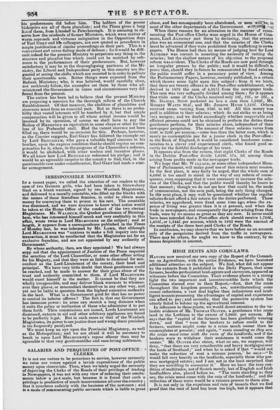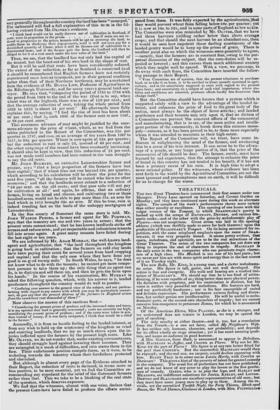HIGH RENTS AND CORN-LAWS.
HAVING now received our own copy of the Report of the Commit- tee on Agriculture, with the entire Evidence, we have bestowed
additional attention on the subject. We find, what did not appear by the extracts from it published in the Daily Papers, that some farmers, besides professional land-agents and surveyors, appeared as witnesses before the Committee. Their evidence places in a strong light the two important and incontrovertible facts which the Committee slurred over in their Report,—first, that the rents throughout the kingdom generally, are, notwithstanding some recent reductions, a vast deal higher than industrious and intel- ligent tenants possessing the advantages of capital and experience can afford to pay; and secondly, that the protective system has utterly failed to bolster up the agricultural interest.
In reference to these points, we would direct attention to the va- luable evidence of Mr. THOMAS OLIVER, a gentleman who rents land in the Lothians to the extent of 2,000/. per annum. He says that the "capital of the farmers has been gradually wearing down," and that " were the bankers to refuse credit to the fariners, matters might come to a crisis much sooner than he contemplates at present ;" and again, " rents standing as they are, the crisis must come with the ruin of the landlords, and if the bankers were to withdraw their assistance it would come the sooner." Mr. OLIVER also states, what no one, we suppose, will deny, "that there are very considerable and heavy mortgages over the lands of Scotland ;" and when he is asked if that "would not make the reduction of rent a ruinous process," he says—" It would fall very heavily on the landlords, especially those who pos- sess mortgaged estates; and I am not in the least surprised that they are unwilling to encounter it." Here we have the true con- dition of multitudes, not of Scotch merely, but of English and Irish landholders also, placed before us. "The rents standing as they are, the crisis must come with the ruin of the landlords ;" and the reduction of these rents would be a ruinous process to them also.
It is not only in the expulsion and ruin of tenants that we find proof that the rent of land has been too high, but it appears that
very generally throughout the country the land has been "scourged." The unlearned will find a full explanation of this Wm in the fol- lowing extract from Mr. OLIVERS .evidence.
"I think land would not be easily thrown out of cultivation in Scotland, if
rents were in proportion to the priors But if rents are not re- duced in proportion to the prices, tenants will be apt to overcrop the land, to enable them to discharge their engagement% until it will not even pay for a diminished quantity of labour, when it will be thrown out of cultivation in a deteriorated state; and if the farmer quit the farm, the landlord will then be obliged to let it at a rent much under the true value of the land."
Thus, we see, that the landlord has not only had the capital of the tenant, but the heart out of his own land in the shape of rent. But it will be said that rents have been considerably reduced. The extent of the reduction, as far as Scotland is concerned (and it should be remembered that English farmers have not certainly experienced more lenient treatment, nor is their general condition better than that of their Northern brethren), may be ascertained from the evidence of Mr. DAVID Low, Professor of Agriculture in the Edinburgh University, and for many years a general land-sur- veyor. He says that, "comparing the period of 1781 to 1794 with the period from 1804 to the end of the war (that is to say, when wheat was at the highest), there was a rise of 150 per cent., and that the average reduction of rent, taking the whole period from 1820 to 1833 is about 24 per cent." He afterwards more fully explains this, by saying, "I find the rise of rent has been about 90 per cent.; that is, each 1001. of the former rent is now 1901., or 90 per cent. more." This enormous advance of rent might be justified by the enor- mous advance in the price of wheat, which, as we find from the tables published in the Report of the Committee, was 52s. per quarter in 1797, and rose, on an average of ten years from 1807 to 1817, to 88e. per quarter. Wheat is now again at 52s. per quarter; but the reduction in rent is only 24,. instead of 40 per cent., and the other outgoings of the tenant have been constantly increasing. It should also be kept in view, that this reduction of 24 per cent. was not made until numbers had been ruined in the vain struggle to pay the old rents. Mr. JOHN BUCKLEY, an extensive Leicestershire farmer and grazier, says " that a large proportion of the farmers have lost their capital ;" that if wheat does not rise beyond 50s. per quarter, which according to.his calculation will be about the price for the next five years, "all the farmers will be ruined who have no other resources;" and that the landlords must submit to a reduction of "50 per cent. on the old rents; and that poor soils will not pay for cultivation at all :" and again, he affirms, that an ordinary farmer, living on bread and cheese, and cultivating two or three hundred acres, would not be able to pay more than 15e. an acre for land which in 1815 brought 30s. an acre. If this be true, ruin is indeed treading fast on the heels of the unhappy mortgagers of Leicestershire.
In the fine county of Somerset the same story is told. Mr.. JOHN WESTON PETERS, a farmer and agent for Mr. PORTMAN, says.that the tenantry are one and two years in arrear • that the present rents cannot stand; that he has known landlords strike off arrears and reduce rents, and yet respectable and industrious tenants fall into arrear again. A great many tenants have failed during the last eight or ten years. We are informed by Mr. ADAM M URRAY, the well-known land- agent and agriculturist, that " the land throughout the kingdom is going back in cultivation ; that the farmers on cold clay lands have been paying their rents for several years from hard cropping and capital; and that the only case where they have done .any good is on god turnip soils." In South Wales, he says, " he does not know what to do with the tenants ; he cannot get more compe- tent persons to take them up ; the only thing that an agent can do, is to distrain and sell them up, and then he gets the farm upon his _hands." In the course of his examination, Mr. MURRAY is asked the following question, which, with his answer to it, landed gentlemen throughout the country would do well to ponder.
" Confining your answer to the general view of the subject, and not particu- larizing with regard to any estates with which you may be particularly conver- sant, do you say that the present distress of the farmers in England arises from the exorbitant rent demanded of them?"
Now observe the answer of this cautious Scot— a Considering the present prices of produce and the increased rates and taxes, it is my opinion that land is generally overrented ; • rents are certainly too high, considering the present prices of produce; and if the rents were taken in pro- duce instead of money, if it was fairly computed, I think that would be a relief to the farmer."
Assuredly, it is from no hostile feeling to the landed interest, or from any wish to hold up the aristocracy of the kingdom as cruel and exacting landlords, that we lay so much stress upon the in- uries inflicted upon the farmers by the present high rents. Like Mr. OLIVER, we do not wonder that, under existing circumstances, they should struggle hard against lowering their incomes. They are entangled in a mesh of difficulties, and stares them in the face. Their unfortunate position compels them, as it were, to be unfeeling towards the tenantry whom their forefathers protected and cherished.
But, although in almost every page of the Evidence attached to their Report, the reduction of rents is declared, in terms more or less positive, to be most essential, yet we find the Committee re- commending any expedient for the relief of the distressed farmers rather than that. This we take to be a blinking of the real state of the question, which deserves exposure. We find that the witnesses, almost with one voice, declare that the present Corn-laws have failed to produce the effects antici- pated from them. It was fully expected-by the agriculturists,that they would prevent wheat from falling below 60s. per quarter; yet it is now at 50s. to 52s., and in some parts of England as low as45s: The Committee were also reminded by Mr. OLIVER, that we have had three harvests yielding rather below than above average crops; and that should the next harvest be an abundant one, thee it would be seen how impotent these darling enactments of the landed gentry would be to keep up the prices of grain. There is another point also on which the witnesses seem generally to agrees —namely, that the farmers are in constant fear, owing to the per- petual discussion of the subject, that the corn-duties will be re- pealed or lowered ; and this causes them much additional anxiety which they might well be spared. With a view, we presume, to do away with such fears, the Committee have inserted the follow- ing passage in their Report.
" Your Committee are of opinion, that the present reluctance to purchase land, or to take it on lease, is to be ascribed to losses recently sustained in agri- culture, and to the uncertainty supposed to exist with regard to the present Corn-laws; and uncertainty on a subject of such vital importance, where sta- bility and confidence are essential, produces effects hardly less disastrous than change itself."
But the Committee should have known that a system which is supported solely with a view to the advantage of the landed in- terest, and enhances the price of food to the great body of the nation, must always be the object of fierce attacks; and landed gentlemen and their tenants may rely upon it, that no dictum of a Committee can prevent the constant efforts of the commercial and manufacturing, that is to say, of the more active and intelli-. gent portion of the community, to break down this ruinous mono- poly—ruinous, as it has been proved to be, to those more especially_ whom it was intended to maintain in their high estate.
The Report of the Committee will, we trust, have some in- fluence in enlightening the mind of the farmer, and awakening him to a sense of his true interest. It can never be to the advan- tage of a people, or any large portion of it, that the price of the necessaries of life should be dear. The farmer, surely, must have learned by sad experience, that the attempt to enhance the price of bread in this country has not tended to his benefit, if it has not been a primary cause of his ruin. It is high time to adopt a more rational policy. If the witnesses, whose evidence has been sent forth to the world by the Agricultural Committee, are not the most ignorant and presumptuous men on earth, it will be difficult for us to change for the worse.



















 Previous page
Previous page